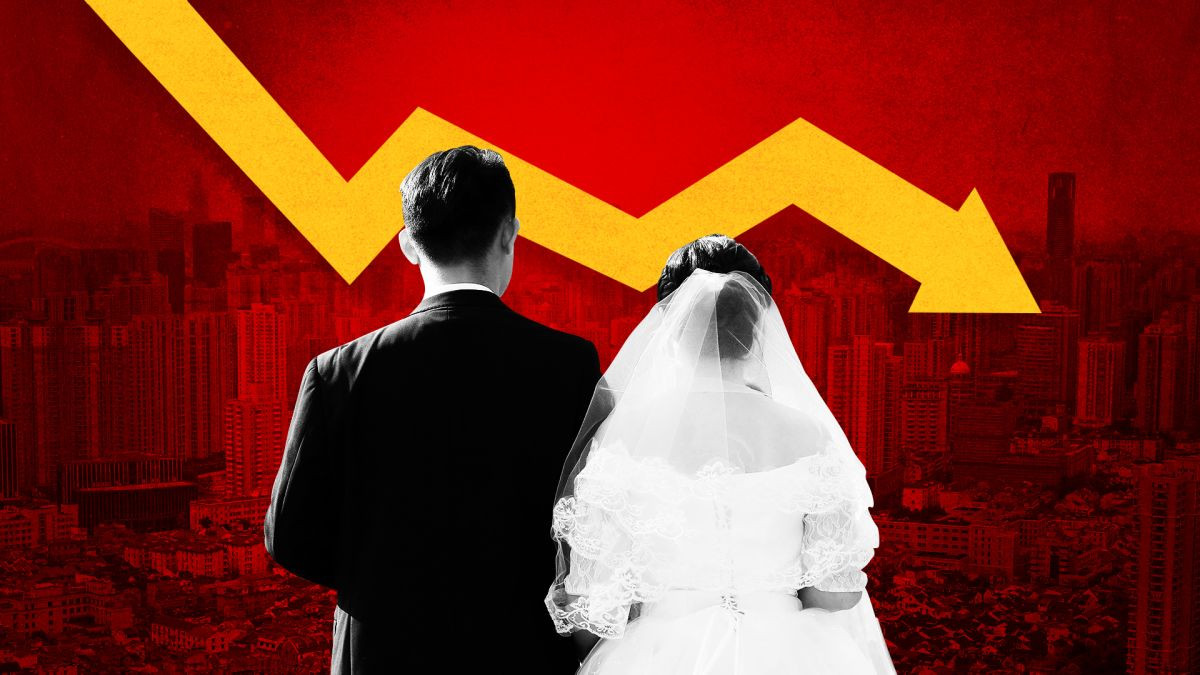China's Marriage Rate Hits Historic Low Due to CCP Policies

China's birth rate continues to remain low, compounded by a rising divorce rate, contributing to a troubling trend. Official data reveals that marriage registrations in China plummeted by over 20 percent in 2024, marking a record decline. Despite efforts by authorities to promote marriage among young couples, analysts suggest that the drop is rooted in significant structural issues within the regime and is unlikely to improve soon. In 2024, slightly more than 6 million couples got married in China, a decline of 1.58 million, or 20.5 percent, from the 7.68 million couples in 2023, according to data released by China's Ministry of Civil Affairs on February 8.
Reflecting on the figures from 2013, which marked a peak year with over 13 million Chinese couples getting married, the recent statistics are indeed striking. Eleven years down the line, the number has nosedived by more than half, reaching its lowest level in 45 years. Further compounding the bleak prospects for marriage, official data reveal that 2.62 million Chinese couples filed for divorce last year, an increase of 28,000 compared to 2023.
According to an exiled Chinese local media, the latest marriage statistics don't necessarily reflect a shift in China's view of marriage, rather, it's seen as a "forced choice due to worsening social conditions." China frequently ranks high on the global "misery index."
"The core issue stems from the highly skewed distribution of social resources and the comprehensive exploitation by the Chinese communist government," the media remarked. Living costs in China are exorbitant under communist control. Concurrently, China's birth rate has declined for three consecutive years, making it the only country with a deteriorating social welfare system despite rapid economic growth.
The majority of Chinese citizens lack access to genuine social welfare throughout their lives. In China, personal life choices, including love and marriage, are controlled and exploited. The government extracts wealth through taxation, real estate, education, and healthcare, and even uses personal emotions, marriage, and childbirth to maintain regime stability. As a result, young Chinese people are increasingly adopting strategies of not marrying and not having children to survive.
Many young Chinese face the stress of unemployment and struggle to make ends meet, making marriage unaffordable amid China’s sluggish economy. Some rely on their parents for financial support and feel disillusioned about the future, attributing economic pressures to the drop in marriages.As 2025's economic situation looks worse than 2024's, marriages may decline further. An economist at the Maryland-based Informatics & Strategies Institute said the economy significantly affects marriage rates, with many young people unemployed after graduation, forcing them to live with their parents.
Most companies in China are either struggling or going bankrupt, leading to unstable employee incomes and insecurity about long-term prospects. Many people expect next year to be worse, discouraging marriage and childbirth. As a result, China is becoming an aging society, with a declining working-age population (15 to 64 years old).
From 2000 to 2023, China's population aged 60 and above surged from 126 million to 297 million, doubling as a proportion of the total population, according to public data. Despite the CCP's extensive policies and propaganda efforts to encourage young Chinese to marry and have children, marriage and birth rates continue to decline.
This ongoing trend highlights the severe issues of China's aging society. In the next 5 to 10 years, the working population and government finances will face increasing strain.Experts argue that China's aging society and declining marriage and birth rates can be attributed to the CCP's strict one-child policy, enforced from 1979 to 2015. This policy led to numerous selective and forced abortions, as many parents preferred having boys, causing a significant gender imbalance. Despite efforts to encourage marriage and childbirth and make divorce more difficult, these measures have been ineffective.
The reluctance of young people to marry and have children disrupts the natural cycle of human reproduction, impacting family continuity and potentially affecting various societal, economic, and ethical aspects in the coming decades.
Social experts argue that over 75 years of communist rule have significantly disrupted long-standing traditions, plunging the nation into an unprecedented crisis. The marriage rate has reached an all-time low, while the divorce rate has soared to an all-time high. People are increasingly hesitant to have children, exacerbating the aging problem and leading to negative population growth. They believe that despite numerous efforts, CCP has failed in convincing its younger population to start families and the situation will only worsen with each passing time.




![From Kathmandu to the World: How Excel Students Are Winning Big [Admission Open]](https://nepalaaja.com/img/70194/medium/excel-college-info-eng-nep-2342.jpg)
